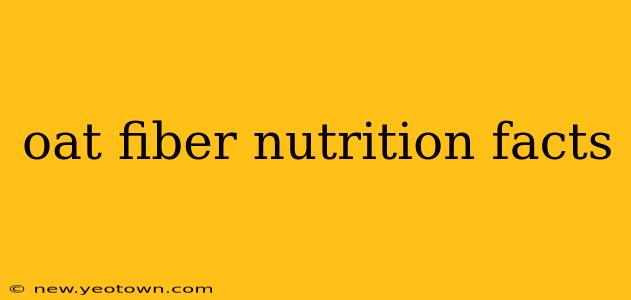Let's be honest, fiber isn't always the most glamorous nutrient. It doesn't boast the vibrant colors of a berry or the satisfying crunch of a nut. But oat fiber, specifically, deserves its moment in the spotlight. It's a nutritional powerhouse quietly working behind the scenes to support your digestive health and overall well-being. This isn't just about another trendy superfood; oat fiber offers real, tangible benefits backed by science. Join me as we unravel the nutritional facts and explore the wonders of this humble yet mighty ingredient.
What Exactly is Oat Fiber?
Oat fiber isn't some isolated, lab-created compound. It's a natural component of oats, the soluble fiber extracted during oat processing. Unlike insoluble fiber, which adds bulk to your stool, soluble fiber like oat fiber dissolves in water, forming a gel-like substance in your digestive tract. This gel is where much of its magic happens. Think of it as a gentle, supportive blanket for your gut.
Oat Fiber Nutrition Facts: A Breakdown
While the precise nutritional content can vary slightly depending on the processing method and the specific oat product, oat fiber generally provides a significant dose of fiber with minimal calories. Here's a general overview:
- High in Fiber: This is the star of the show. Oat fiber is predominantly soluble fiber, making it incredibly beneficial for digestive health.
- Low in Calories: It's a great way to add bulk to your meals and increase satiety without significantly increasing your calorie intake – perfect for weight management.
- Minimal Fat and Sugar: Essentially negligible amounts, making it a healthy addition to any diet.
- Source of Beta-Glucan: Oat fiber is a rich source of beta-glucan, a specific type of soluble fiber known for its cholesterol-lowering properties.
How Much Oat Fiber Should I Consume Daily?
There's no one-size-fits-all answer here. Dietary fiber recommendations vary depending on age, sex, and overall health. However, aiming for a diet rich in fiber, with oat fiber playing a key role, is generally beneficial. Check with your doctor or a registered dietitian to determine the appropriate amount for your individual needs. They can help you incorporate oat fiber into your diet safely and effectively.
What are the Health Benefits of Oat Fiber?
The benefits of oat fiber extend far beyond simply promoting regularity. Let's dive into some key advantages:
Improved Digestion and Regularity: The soluble fiber in oat fiber absorbs water, creating a soft, bulky stool that eases bowel movements and prevents constipation.
Lowering Cholesterol: Studies have shown that beta-glucan, abundant in oat fiber, can help lower LDL ("bad") cholesterol levels, reducing the risk of heart disease.
Blood Sugar Control: Oat fiber slows down the absorption of sugar into the bloodstream, helping to stabilize blood sugar levels and preventing spikes and crashes, particularly beneficial for individuals with diabetes or insulin resistance.
Increased Satiety: The gel-like substance formed by oat fiber in your stomach expands, promoting a feeling of fullness and helping you manage your appetite. This can be a valuable tool for weight management.
Improved Gut Microbiome: Oat fiber serves as prebiotic fiber, feeding the beneficial bacteria in your gut and promoting a healthy microbiome. This contributes to overall digestive and immune health.
Is Oat Fiber Good for Weight Loss?
Oat fiber can be a valuable asset in weight management efforts. Its high fiber content promotes satiety, helping you feel fuller for longer and reducing overall calorie intake. The low-calorie nature of oat fiber also contributes to its effectiveness in weight loss plans. However, it's important to remember that oat fiber is part of a holistic approach to weight loss; it's most effective when combined with a balanced diet and regular exercise.
Where Can I Find Oat Fiber?
Oat fiber is readily available in various forms:
- Oat Bran: A good source of oat fiber, often used in cereals and baked goods.
- Oat Fiber Supplements: Convenient powder form, easily added to smoothies, yogurt, or baked goods.
- Whole Oats (rolled or steel-cut): Although not purely oat fiber, they contain a substantial amount and offer additional nutrients.
Are There Any Side Effects of Oat Fiber?
While generally safe, consuming too much oat fiber too quickly can lead to digestive discomfort, including gas, bloating, and cramping. It's best to gradually increase your intake to allow your body to adjust. Individuals with certain medical conditions should consult their doctor before significantly increasing their fiber intake.
In conclusion, oat fiber is a nutritional treasure, offering a wide range of benefits for your digestive health and overall well-being. Its ability to improve digestion, lower cholesterol, control blood sugar, and promote satiety makes it a valuable addition to a healthy lifestyle. Remember to incorporate it gradually into your diet and listen to your body. Your gut will thank you for it!

